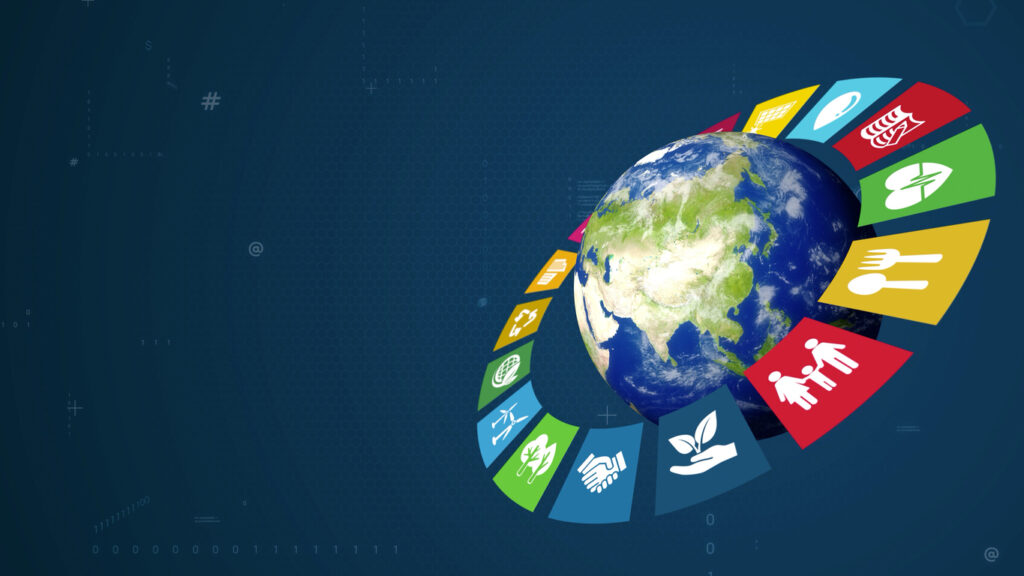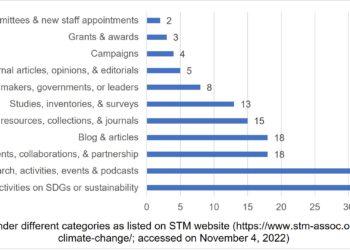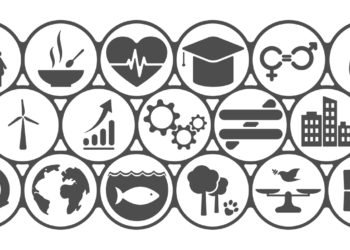Editor’s Note: Today’s post is by Rachel Martin. Rachel is the Global Director of Sustainability at Elsevier, where she is driving transformational change in the priority areas of sustainability and SDGs, with a focus on climate action. She serves as the Chair of the Social Responsibility Committee at STM.
Back in 2015, the United Nations launched the 17 Sustainable Development Goals (SDGs), a blueprint for action that set ambitious targets to deliver an equitable, sustainable, and inclusive society by a deadline of 2030. Science and research are arguably the foundational pieces needed to advance this agenda, and scholarly communication and dissemination a critical element. Yet as we see record-breaking temperatures gripping parts of the US and Europe, set against the backdrop of rising inequalities and conflict, it is clear we need more action. The question is what role can and should publishers play?
Sustainability, Environmental, Social & Governance (ESG), social responsibility (SR) and similar terms that are often used interchangeably, and it can be confusing. In many cases, they are complementary as fundamentally they are all providing a different perspective to account and measure for an organization’s impact on society. Putting terminology to one side, we are seeing an increasing number of publishers aligning their sustainability, ESG, and SR efforts around the SDGs and with good reason. The SDG agenda has been the fastest adopted international framework for sustainable development to date. It has aligned efforts across governments, civil society, and citizens, with organizations, such as publishers, recognizing the role they must play as well.

For academic publishers, there are two broad ways to support and drive the SDG agenda. The first is to make sure we are responsible businesses. This means implementing policies and a workplace culture that will foster diversity, act on climate, and address inequalities. The second aspect is to be a catalyst of change through the content that is published, providing platforms to debate sustainability issues, foster interdisciplinary research, and ensure a wide dissemination of knowledge. Both elements are reflected in the SDG Publishers Compact, launched in 2020 as a joint initiative from the International Publishers Association (IPA) and the United Nations. Its 10 concrete action points orient around both internal and external activities that will promote awareness and action to achieve the SDGs. To date, just over 300 organizations from all parts of the sector –trade, education, and academic — have signed up.
When launched, it was the academic publishers who were among the first to sign, alongside our trade organizations such as STM, ALPSP, and EASE, perhaps recognizing the importance of the SDGs due in part to the very nature of publishing the science behind the challenges that the SDGs seeks to solve. But the compact is more than just a vague commitment. It requires clear action, such as making someone responsible for SDGs/sustainability within your organization or selecting a focus SDG goal. All of which have resource implications that ultimately favor publishers who can afford to do this. But we need all publishers to prioritize and act on the SDGs. So, the question is: why haven’t all academic publishers signed up?
Sustainability is an additional consideration for many publishers and goes beyond the familiar social responsibility programs around donation, prizes, and sponsorship. Not only do you need to be aware of the SDGs and the SDG Publishers Compact, but you need to understand the implications for your business. Understanding how your journals, books, products, and services help drive societal impact is important to enable you to select focus SDG goals, as is having resources available to participate in industry committees, set targets, report on progress, and convene cross-departmental teams internally.
It is not just looking at SDGs. There are a lot of industry initiatives to sign up and join as well. If you wish to progress diversity and inclusion, you might sign up to the C4DISC Statement of Principles or join the joint commitment for action on inclusion and diversity in publishing. If you focus on equity, you might donate content and get involved in Research4Life or signal your commitment to accessibility and sign the Charter for Accessible Publishing. It can be daunting just thinking about where and how to get started.
This is the reason why STM has now launched an SDG roadmap. It is a list of suggested steps to provide inspiration and pathways to navigate the sustainability initiatives and actions that publishers and societies can undertake. The roadmap takes the form of three levels. The first outlines the steps you could take to feel comfortable with signing up to the SDG Publishers Compact and getting involved in key industry initiatives. The roadmap is filled with suggested links and resources such as slide decks or examples of checklists to enable all STM Association members to start a sustainability conversation within their organization. Level 2 and 3 are in development and will provide suggestions and stretch goals for SDG Publisher Compact Signatories who have already signed up to help think about all aspects of how they can drive sustainability.
Whilst this is a great first step, a crucial element of action is accountability. STM as a signatory to the compact has set an ambitious target to not only provide this foundational resource for members, but to encourage 50% of its 140 members from over 20 countries to sign up. This is significant. STM members account for 66% of all journal articles and tens of thousands of monographs and reference works. Encouraging and actively recruiting more signatories will inevitably fulfil STM’s role to drive sustainability within its own organization. The starting blocks are being put in place. The establishment of a new Social Responsibility Committee that sits alongside committees for Open Research and Research Integrity provides a vital third pillar to embed sustainability in our industry. The roadmap launch is one of the first outcomes of this committee.
If you are not already a signatory, we encourage everyone to sign up to the SDG Publishers Compact and also join the STM Social Responsibility Lab group to get involved in this work.
Discussion
1 Thought on "Guest Post — Navigating the Sustainability Landscape: A New STM Roadmap Provides a Guide to Embedding Sustainability in Publishing "
Thank you for sharing the continued progress of the Social Responsibility Committee at STM to launch the Level 1 SDG Roadmap. I am honored to represent Wiley on this important Committee, supported by two colleagues who have contributed to the building of the roadmap and are actively working on the next levels. As publishers, we can all play a critical role in advancing our commitments to SDGs and leading global change on issues where we have expertise to share. I know the industry is up for the challenge. After adopting our own SDG agenda, we have committed to advancing Climate Action, Quality Education, and Reduced Inequalities, which has helped us in prioritizing the areas of greatest impact for our business as well as customers and colleagues. Others will be able to see similar benefits in their own impact as they adopt their SDG Roadmaps and sign the SDG Publishers Compact. I hope that this roadmap and the practical resources it contains will encourage and support other academic publishers to sign on and take action as we work towards a more sustainable future.



